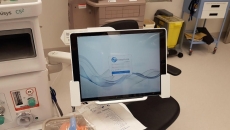Clinical
Dr. Oscar C. Marroquin, chief healthcare data and analytics officer at the UPMC health system, discusses numerous AI algorithms used to improve care delivery, and a five-year agreement with Microsoft to modernize the clinical analytics infrastructure.
Also, WA Health has started expanding its remote monitoring technology to regional communities.
By having deep conversations about artificial intelligence's capabilities and limitations, the nine-state health system hopes to help its clinical and IT leaders enable a more responsible path forward for AI deployments.
Powered by Amazon Bedrock, AWS will now offer artificial intelligence to quickly create clinical notes that can be added to EHRs. A new imaging service, meanwhile, could help reduce costs compared to self-managed infrastructure.
Traditional care coordination efforts are labor-intensive and can be variable in execution, but automated orchestration can standardize workflows and help avoid clinician burnout, says Greg Miller, chief growth officer at Lumeon.
According to Dr Mark Davies, IBM's Chief Health Officer, there are huge potential benefits from digitalizing citizen engagement.
Data integrity and model validity are also must-haves, says an expert, who offers his ideas on a "clean data" mentality and explains why explicit consent is essential for training algorithms.
It's crucial to pool resources to improve outcomes during times of crisis, says Dr. Monica Bharel, advanced clinical senior public health advisor and former commissioner of the Massachusetts Department of Public Health.
CCA prioritizes virtual care because access to technology is a social factor that impacts health – and it enhances care coordination by engaging members where they are.
A shortage of skilled nursing is disrupting care delivery nationwide. The workforce challenge is not going away, and will require creative approaches, including virtual care, says Wendy Deibert, chief nursing officer at Caregility.









